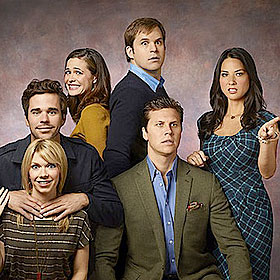Perfect Couples

3/5
Premiering to rather tepid ratings and generally snubbed by critics, Perfect Couples is a somewhat hollow sitcom whose sole premise is that it’s about couples – three men and three women. Three couples, each an artificially constructed archetypal duo, live in an abstract world constructed from sets and studios, a world of living rooms, bedrooms and entryways that bears little connection to reality. But as the jokes unfold, hilarity ensues, and the show is far from a bust – though it’s hardly anything special either. More like a series of Saturday Night Live skits, but without the variety of content, just the same people playing the same exaggerated characters over and over again.
Dave (Kyle Bornheimer) and Julia (Christine Woods) are the normal couple; levelheaded and somewhat boring, they represent the familiar and are the couple with whom the audience is supposed to identify. Vance (David Walton) and Amy (Mary Elizabeth Ellis) are completely insane; they switch between trading insults and declarations of love so quickly, it doesn’t really seem like there’s really any difference. And Rex (Hayes MacArthur) and Leigh (Olivia Munn) are self-obsessed egomaniacs who outmatch their love for themselves only with their infatuation with each other.
These are great starting places for characters, each couple carefully constructed to be distinct from the others, to be an interesting contrast to the others. But these launching points cannot form whole characters – which, in the case of Perfect Couples, they try to do. Flat and superficial, the resulting characters rarely dive beneath the surface, remaining instead as blow up dolls, inflated caricatures that can be funny at times, yes, but fail to engage the viewer, to keep them interested. Predictability becomes an issue very quickly, which takes the oomph out of the jokes. I can only be startled so many times by Vance and Amy’s spinning a U-turn from screaming bloody murder at each other to making out on the floor, or by Rex and Leigh’s obnoxious self-congratulatory comments.
Further exacerbating the issue of predictability is the palatable staleness of the characters’ world. Almost every scene takes place in one or another of their homes – worse yet, they don’t even have interesting homes! Given the effort that was put into diversifying the show’s personalities, you might think equal attention would be directed at creating unique living spaces – but no. To be perfectly honest, I confused which house belonged to whom. A little life outside the box could breathe a much needed sense of reality to this show – look at It’s Always Sunny in Philadelphia: also a show about nothing so much as a group of bizarre caricatures tooling around, it brings life to its comedy by integrating its world with that of Philadelphia; the innate complexities, the refreshing characters, the inspiration outside environments can contribute can all add color and depth to an otherwise irrelevant television sitcom.
That said, a few of the performers deserve recognition for some fantastic deliveries. Woods, who appeared last year as an internally conflicted double agent on the action drama Flash Forward, does an excellent job making a character predetermined to be boring very funny. As a typically serious performer without any of the other actor’s hyperbole, the subtlety with which she delivers sardonic zingers succeeds because of the way it contrasts her otherwise straight-laced character. Walton, likewise, brings a bit of contrast to his character. On the opposite end of the extreme, his character is supposed to be a nut, completely zany and irresponsible. So when he dons a serious face, lecturing the square-as-a-box Dave about his lack of control, you have to laugh. These characters succeed because there are at least two sides to their characters, while the others stutter monophonically.
Several episodes in, the show does begin to find its stride. As the actors settle into their roles, even the most exaggerated players tone it down and experiment outside the boxed definition of their surface-level characters. They start playing off of each other more, which proves fruitful in mining for some originality. The real problem with this show, however, is not the characters or the actors, who will find their way eventually and dig deeper than caricature. The real problem is a dearth of subject content and plot. The show is about nothing. Yes, it’s true: it’s about couples and their relationships. But what show isn’t? A premise like that is just like any other show out there, but stripped down to its bare essentials. Before long, the episodic content is going to dry up and shrivel. Without outside characters, without outside environments, without multi-dimensional characters – without any real personality, Perfect Couples will not be able to last.
RELATED ARTICLES
Get the most-revealing celebrity conversations with the uInterview podcast!





Leave a comment